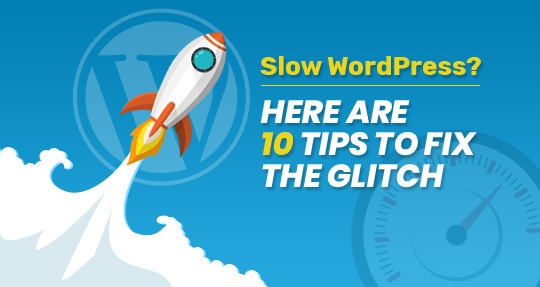Arun ran a blog on WordPress. Initially, everything went fine but later, things started changing. His WordPress website started lagging. Now, it takes nearly 5 seconds to load properly. Gradually, its Google ranking deteriorated. Even after installing a speed-up plug-in, Arun didn’t see improvement in his WordPress website.
Such instances are common with people worldwide. To cope up with the speed of the website, installing merely a plug-in is not the solution. When the speed of the website is like that of a snail, adding plug-ins will not resolve the issue. Thus, it is essential to grab the root of what makes the website load or run slow. Today, people use their mobile phones for visiting a website and as per Google reports, the ideal time for a website to load on a mobile screen is between 12-17 seconds. If your website takes a long time to load, it is time to approach a company offering WordPress development services.
So, here’s what all you need to tackle the glitch and wish your WordPress website a ‘speedy’ recovery.
1. Kickout Unwanted Plug-ins
Plug-ins are a laudable apprentice for WordPress websites. I.T mavens suggest the utilization of these plug-ins. But do you think adding more & more plug-ins would sort the tussle? By adding multiple plug-ins, a WordPress website can be hacked easily. Moreover, it could lead to a performance glitch because every plug-in is not compatible and could make the website heavy. Reduce the number of plug-ins and keep the required ones.
2. Smart Compression for Images
Image optimization should be the prime priority when you want to speed up the WordPress website. When the media on the website is heavy, it tends to slow it down. Heavy imagery and auto-play audio/video contribute to WordPress website slowdown. This problem is frequently encountered by travel and food bloggers because they upload heavy images like a frenzy. Hence, experts from the WordPress development service industry emphasize on using image compression plug-ins that compress and optimize images without hampering the quality.
3. Disarm Hotlinking
Hotlinking is a widely popular practice for WordPress. It is like backlinking a write-up that takes the user to the original link attached. Hotlinking is used for images & media i.e. your server would be used for loading the imagery/media linked on another WordPress website. It consumes the bandwidth of your server. Once hotlinking is enabled, Error 403 will be displayed on all external sites that link the imagery from your server.
4. Ads & Scripts: Keep’em At Bay
Another reason for a WordPress weblog slowdown is unnecessary HTML adverts. Since the content material in these adverts is usually pointless, it tends to degrade the performance of the website. Instead of making the website deplorable with lamenting ads and scripts, use Google Adsense for an optimized CPC.
5. Full Page Caching
WordPress websites function properly when it is cached. By caching it at regular intervals, the performance speed of the website is increased and the load on the server is reduced. In a nutshell, caching the WordPress website protects from website performance sabotage.
6. Reduce External Requests
By reducing external requests, you can drastically improve the overall functional speed of the WordPress weblog. Since external requests use DNS for operation, and you cannot steer it, the speed of the weblog or website automatically downscales. Hence, it is essential to debar the external requests for a domain that you cannot control.
7. Monitor The Website Speed
‘How would I monitor the website speed?’ is a common question that pops up. It can be checked by using different speed monitoring tools for WordPress. Without keeping a track of website speed, you wouldn’t be able to assess its overall performance. Google Page Insights is the best tool for monitoring the speed of the website. It is a free tool that creates a report by assessing the speed of the WordPress website.
8. Choose a Reliable Host
Hosting is important because it is the cornerstone of your online presence. When the WordPress website becomes the source of earning, you should pay to get better hosting for the same. With proper WordPress website hosting, you can easily manage the speed of the website along with its consistency.
9. Utilize PHP7
Its 2020 and technological advancements are advancing consistently. PHP7 is the latest version of the WordPress framework that was introduced in 2015. Currently, 7.4 is the leading version that provides optimal experience by increasing the operational speed of the website. However, it is suggested to test the PHP7 compatibility before using it.
10. De-clutter Media Library
Individual writers and bloggers using WordPress often face the trouble of cluttered media in the library. Accumulation of old files and videos slows the website speed and hence, de-cluttering it makes it simple. Dedicate an hour or two to identify the unwanted stuff from the media library and de-clutter it.
Summarizing It Up Right from selecting the appropriate web host to using the latest framework versions, you just learned how to fix a slow WordPress website. Following these ten footsteps will help you in speeding up the WordPress website. You have the checklist, so, tick what’s missing.













